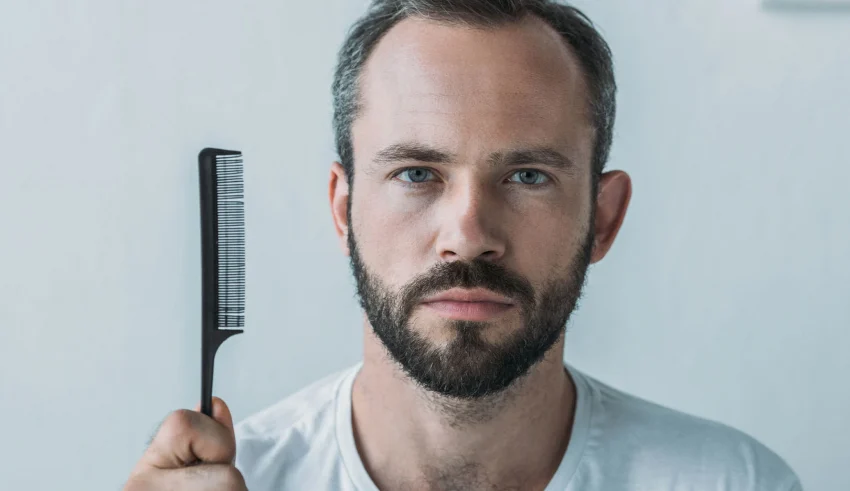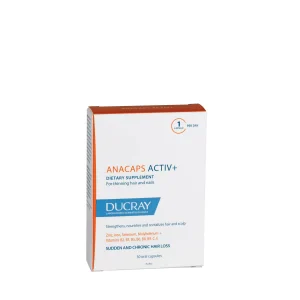
Hair loss is a real concern for most people, regardless of gender, as hair loss leads to low self-esteem and low confidence. Hair loss supplements, also known as hair loss pills, can be helpful. Keep reading to learn what are the best vitamins for hair loss, and how to find a hair loss supplement that will work for you, in collaboration with the dermatologist Dr. Waleed Alsalhi.
Should I take a hair loss supplement?
It is normal to lose 50 to 150 strands of hair per day. But if you lose more than that, you may be experiencing hair loss. If you have hair loss, you may notice that there is more hair than usual on your hairbrush or in your shower tray. Other people notice their hair loss based on their physical appearance. For example, for men, hair loss usually means thinning around the hairline and at the crown of the head. For women, diffuse hair loss is more common.
If you are experiencing hair loss, you may benefit from taking a hair loss supplement. There are many causes of hair loss, including hair loss due to a vitamin or mineral deficiency. Which vitamin deficiency leads to hair loss? Dr. Waleed Alsalhi notes that a deficiency of iron, vitamin D, zinc, and selenium can cause hair loss.
In these cases, taking hair loss vitamins can help you regain a fuller, healthier head of hair. Even if you are not experiencing hair loss, it may be a good idea to take a hair loss supplement as a preventative measure.
How do vitamins for hair loss work?
A balanced diet helps you maintain overall health as well as healthy hair. A healthy diet consists mainly of fruits, vegetables, and whole grains, with smaller amounts of protein, beans, dairy products, and oils. Chips, candy, cookies, and other sweets and snacks should be eaten in moderation.
However, eating a healthy diet is easier said than done! With all the stresses of daily life, it can be difficult to eat the wide variety of foods your hair follicles need to grow hair. That’s why, in many cases, hair loss is the result of poor diet or nutritional deficiency.
The good news is that anti-hair loss vitamins work by providing your diet with all the vitamins and minerals your hair follicles need for healthy hair growth. They help “fill in the gaps” in your diet so that your hair growth never suffers.
To find out the best anti-hair loss supplements and how to restore hair loss, read on!
What are the best vitamins for hair loss?
The vitamins and supplements you consume will be absorbed into your bloodstream, where they will nourish every cell in your body, including your hair follicles. According to Dr. Waleed Alsalhi, these include vitamin A, biotin, vitamin C, vitamin D, and vitamin E.
If your diet isn’t providing enough nutrients, supplements can help fill the gap, otherwise, your hair may suffer. Another set of nutrients to look for are B vitamins and omega-3 fatty acids.
1- Vitamin A
One of the most important anti-hair loss vitamins is vitamin A. Vitamin A helps your body maintain healthy skin and hair. It also promotes the production of sebum, the natural oil that keeps your skin and hair moisturized. If sebum production is insufficient, your hair can become brittle and prone to breakage.
2- Vitamin B12
Although the mechanism is not fully understood, it is believed that this vitamin contributes to hair growth because it plays a vital role in the rapid division of hair follicle cells. This is why vitamin B12 deficiency is closely linked to hair loss.
Vegans or vegetarians are more likely to suffer from vitamin B12 deficiency because animal products such as meat and dairy products are the only good sources of this vitamin.
Therefore, if you are on a plant-based diet, consider taking an anti-hair loss supplement formulated with vitamin B12.
3- Biotin
Biotin plays an important role in the synthesis of healthy skin, hair, and nails, which is why it is one of the best vitamins for hair loss. According to Dr. Waleed Alsalhi, when you lack biotin, your body is unable to create enough red blood cells, which results in a decrease in oxygen supply to your scalp. As a result, your scalp is not properly nourished and you experience hair loss.
4- Vitamin C
Vitamin C is also one of the best vitamins for hair loss. Vitamin C helps fight oxidative stress, which is responsible for hair aging.
Vitamin C also facilitates the absorption of iron. Iron deficiency (also known as anemia) is another major cause of hair loss.
5- Vitamin D
Vitamin D is an important vitamin for hair loss, as it helps hair follicles function properly.
Vitamin D deficiency is linked to alopecia areata, a form of hair loss, as well as female pattern baldness. Dr. Waleed Alsalhi explains that when vitamin D levels are low, hair can thin out or stop growing.
6- Vitamin E
Vitamin E is a powerful antioxidant that promotes hair growth in people with hair loss.
7- Zinc
Like vitamin D, zinc has also been associated with alopecia areata. Zinc plays an important role in the functional activities of the hair follicle.
8- Selenium
Selenium is a trace mineral that plays an essential role in the growth and maintenance of healthy hair. For example, selenium kills dandruff fungi and also protects hair from free radicals.
9- Niacin
Niacin deficiency also causes hair loss. Dr. Waleed Alsalhi explains that the main role of niacin is to convert food into energy that our body can use later. This helps to keep our skin, hair and nails healthy. He adds:
- Niacin is used for hair because of its known functions in cell division and regeneration.
- Niacin also helps the body absorb calcium. This is another important factor in maintaining healthy hair.
Having mastered the basics, here are the best hair loss vitamins and supplements for growing healthy, shiny hair.
Ducray Anacaps Food Supplements
What else should I know about hair loss supplements?
You know it’s hard to choose a hair growth supplement when there are so many on the market. That’s why it’s essential to look at the labels and find the ingredients you want. When buying hair loss supplements, make sure you choose those that contain the best anti-hair loss vitamins.
It’s always a good idea to talk to your doctor to make sure they don’t interact with other medications you’re taking.










